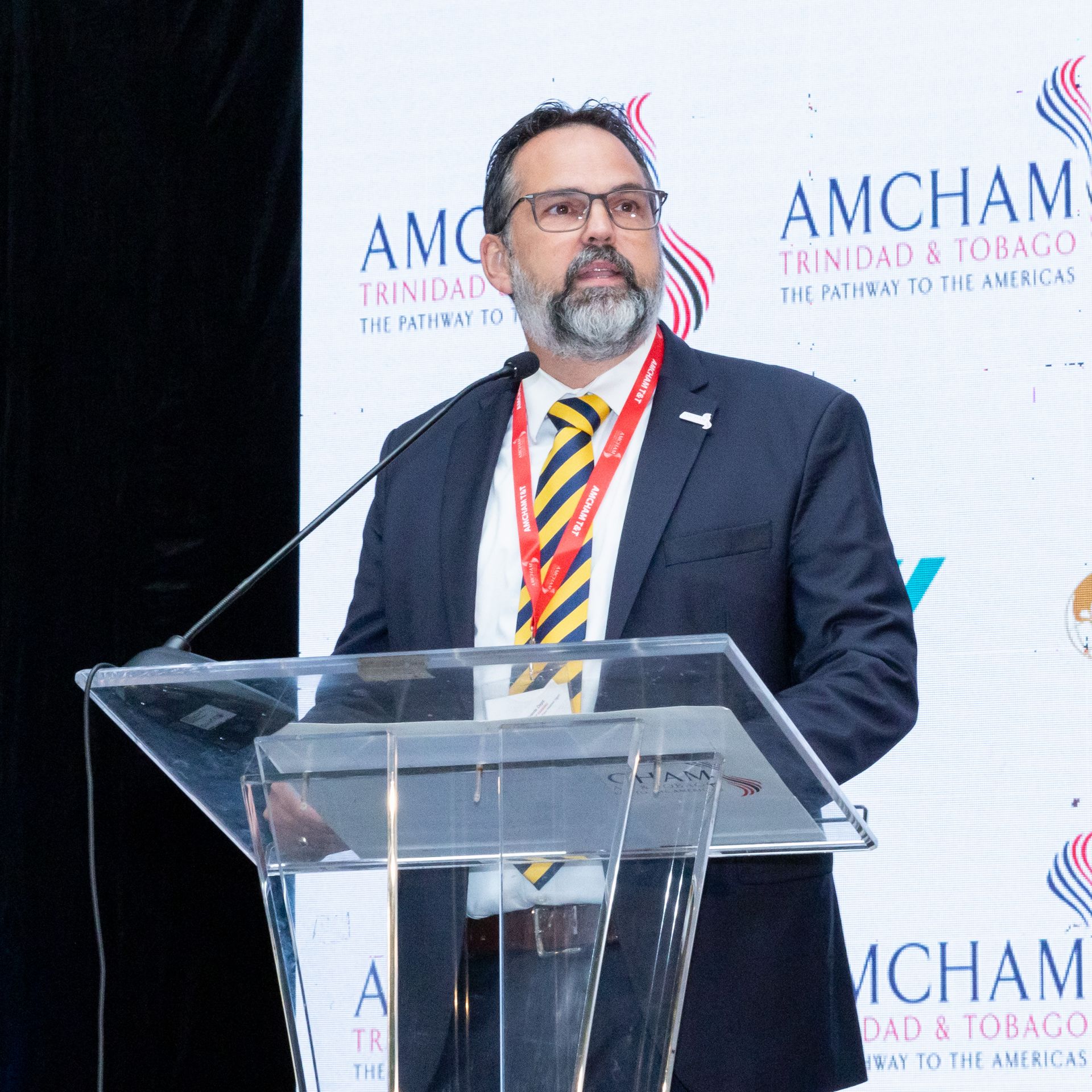
Good morning, everyone.
It is my pleasure to welcome you to AMCHAM T&T’s Annual Economic Outlook Forum for 2024.
What makes this forum so important is that it allows you - our members - a platform to share concerns and put forward recommendations that will ultimately help us better understand the broader economic environment, enabling more informed decisions and more effective strategic planning. We also bring together business leaders to share their insights so that you can take those into consideration as you plan. Of course, this is also a great opportunity to network.
Today our colleagues at EY Caribbean will once more present key findings from our economic pulse survey that we conducted with our membership. I would like to thank all our members for contributing to this survey, as it reflects a collective effort to understand and address economic challenges and opportunities via a more collaborative and unified approach.
Additionally, the presence of Mr. Gregory Hill, a former Amcham T&T Board Member and now VP of Operations at the Caribbean Development Bank - as our featured speaker. Gregory’s extensive experience and diverse perspective will add a significant layer of insight to the economic landscape and its potential impact on various sectors.
Today we want to assess our nation’s economic reality via the theme “Adaptation & Resilience”.
Before I begin, I want to say that I am not about to tell a room of business leaders how to adapt or be more resilient. The fact that you and your businesses are still standing after the shocks of the past few years (Covid 19, supply chain issues and Fx shortages) is testimony that you know how to adapt and be resilient. What I propose to do is merely highlight some of the issues and suggested solutions that members have shared with us.
A close glance at our economy reveals trends that are both promising and concerning. Recent reports from the UN and IMF have indicated that GDP growth will likely remain positive in 2024 although softer energy prices will pose a risk to our economic outlook. Based on these reports, we can expect GDP growth in Trinidad and Tobago to slow from 3.1% in 2023 to anywhere between 2.2% and 2.4% this year.
Meanwhile, Trinidad and Tobago’s annual inflation is expected to decline from 5.1% to 3.2% in 2024. All of us will welcome a reduction in inflation. Let’s hope those predictions are accurate.
As you know, many external forces outside our control conspire to derail our best economic policies. The economic forecast for our region predicts a deceleration of GDP growth which leaves our region on track to resume the low-growth trajectory observed before the pandemic. Meanwhile, on the domestic front, rising crime, climate-related shocks, falling water levels in the Panama Canal, global conflicts affecting both supply and shipping routes, and the El Niño phenomenon could disrupt economic activity, increase food prices, and trigger renewed inflationary pressures.
I am not saying this to be negative. Rather, I want us to have a clear understanding of the challenges we may face in 2024. At last week’s Ambassador’s Reception, I asked you to adopt an approach that transcends challenges and fosters greater positive change. However, the success of both our economic and social policies is dependent on us making sure we have crime under control. While I am always a firm believer in prayer, I also believe this is a situation that requires action and greater collaboration from ALL of society. As representatives of the private sector, let me reiterate that we stand ready and willing to work with the TTPS, government, and opposition on this very important issue.
That’s why we must ensure that we are using state-of-the-art DNA testing and equipment at the Forensic Science Center with the most modern investigative techniques to combat crime. Additionally, we must develop a comprehensive and centralized database with DNA profiles from all convicted offenders, suspects, missing persons as well as victims of crime. We also need to ensure that our digital transformation journey extends to the TTPS to procure state-of-the-art software for managing the flow and oversight of investigations and the use of the hardware, software, and cybersecurity protocols to protect case file data, and this should extend to case management.
We should go further with proactive policing using data analytics to predict and prevent flare ups after initial crimes and to identify and disrupt gang activity. However, let’s be realistic. We need to have concerted action and results targeting the big fish: The people who pretend to be legitimate businesspeople but are deeply entrenched in criminal activity. White-collar crime and corruption are insidious. This is destroying our country. It’s time for the TTPS to publicly state their metrics and for us all to work together to achieve them while simultaneously holding each other to account.
None of this will be successful if we aren’t strengthening the Judicial process by reducing the gap between arrest and sentencing; and seeking out better avenues for rehabilitation for ex-convicts to help them better reintegrate as productive members of our society.
Let me be clear. If we don’t make inroads and reduce crime in 2024, the country and its institutions will be even more seriously weakened. More investments will be halted, more of our professionals will migrate and more lives will be lost.
Meanwhile, Digital Transformation continues to hold the key to unlocking so much of our country’s economic prospects, and yet progress seems slow. We acknowledge the work being done to establish the Office of the Information Commissioner and towards the National e-ID. But truthfully, we need to move from “work in progress” to “in production” on a few of these initiatives in 2024.
Concurrently, I implore all the business leaders in the room today to continue investing in your organization’s digitalization projects to boost innovation and competitiveness. The rewards will come as our world continues to grow digitally. I hope to see us investing more in ICT skills development and education in our primary schools, secondary schools, tertiary level institutions, and workplaces to fill gaps in capabilities and competencies needed to support digital transformation.
I also want to see us move quicker in enabling a legislative environment conducive to advancing the digital economy. While we have seen some advancement in the policies and strategies related to Data Strategy, Policy and Framework, Remote Working Policy Suite, and Change Management, we would like to impress upon the Government the importance of the development of GORTT Asset Management and Open Government Policy to identify just two that would advance and support the country’s digital strategy.
We also need to be bolder and more transformative on the roadmap of our digital journey. Imagine if we were to implement a Digital Nomad Visa as part of our country’s diversification efforts. Think about the talent pool this would attract, revenue earned, and boost to local business. This could be a significant enabler to economic growth while also both putting T&T more firmly on the map of favourable digital destinations and attracting talent for the businesses operating in T&T.
Now, even as we invest in digitalization, cyber-attacks and cybercrimes have become a serious impediment to business and national security. We must do more to protect our client/company data and infrastructure from cyber criminals.
The proposed cybersecurity tax allowance should be welcomed by the private sector since it allows for additional incentives for companies to invest more in personnel education and technologies to protect their operations while simultaneously strengthening national security with the appropriate cybersecurity solutions for their businesses.
Additionally, we need urgent legislative reform to criminalize cybercrimes and cybercriminals to protect both the interests of business and national security. As the Government incentivizes cybersecurity in the private sector, we look forward to an updated cybersecurity strategy for the public sector, inclusive of training for public servants and the general public. This will be important for building the public’s trust and increasing the uptake and usage of the digital services as more and more become available.
We also need a comprehensive operational overhaul of Customs to create sustainable solutions to the problems that businesses face at our nation’s ports. While we applaud the short-term improvements and positive engagements with the Ministry, problems persist with staffing, long delays, and changes in operating procedures that negatively impact business. We need standard operating procedures, full implementation of the electronic system of clearance, data-enabled risk management systems, a practical trusted-trader system, a return to pre-covid levels of clearance, the equivalent of service level agreements for the number of shipments processed by officers on a shift and cutting down of overtime to list a few.
Technology can solve some of these issues, but we also need strong leadership that can adequately manage the responsibilities of border protection, revenue collection, and trade facilitation while improving Customs efficiency. In this regard, we hope to see the long-promised TTRA operationalised soon.
The recent Dragon Gas deal signed with Venezuela will make us a much stronger energy player for many years. Indeed, this is good news all around, but we cannot lose our focus on diversification efforts. That’s why we must continue attracting investments in new industries and sectors such as the tech sector, tourism, agriculture, manufacturing, and renewable energy. We can create more new jobs in the clean energy sector and reduce the reliance on fossil fuels by developing a comprehensive energy sector strategy that addresses the entire value chain for the most effective monetization of the nation’s hydrocarbon resources, and transition to renewable sources of energy and fuel.
As I close, I would like to ask for some introspection. Think about the role you would like to play in helping our nation get to where we want it to be.
If you are willing to be an active participant in this engagement and you desire a country with sustained long-term economic development that attracts business, increases social mobility, and reduces inequity, then I am sure we can achieve this so long as we continue to adapt, be more resilient and most importantly, collaborate and engage more with each other.
I hope that’s the mindset you take with you as you overcome challenges and find success in 2024 and beyond.
THANK YOU and May God continue to Bless us all and our Nation!
END!
